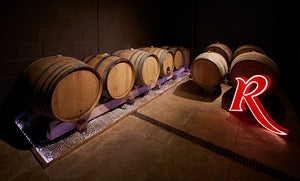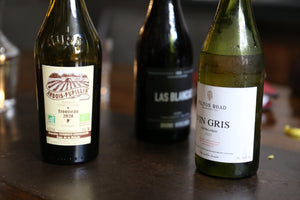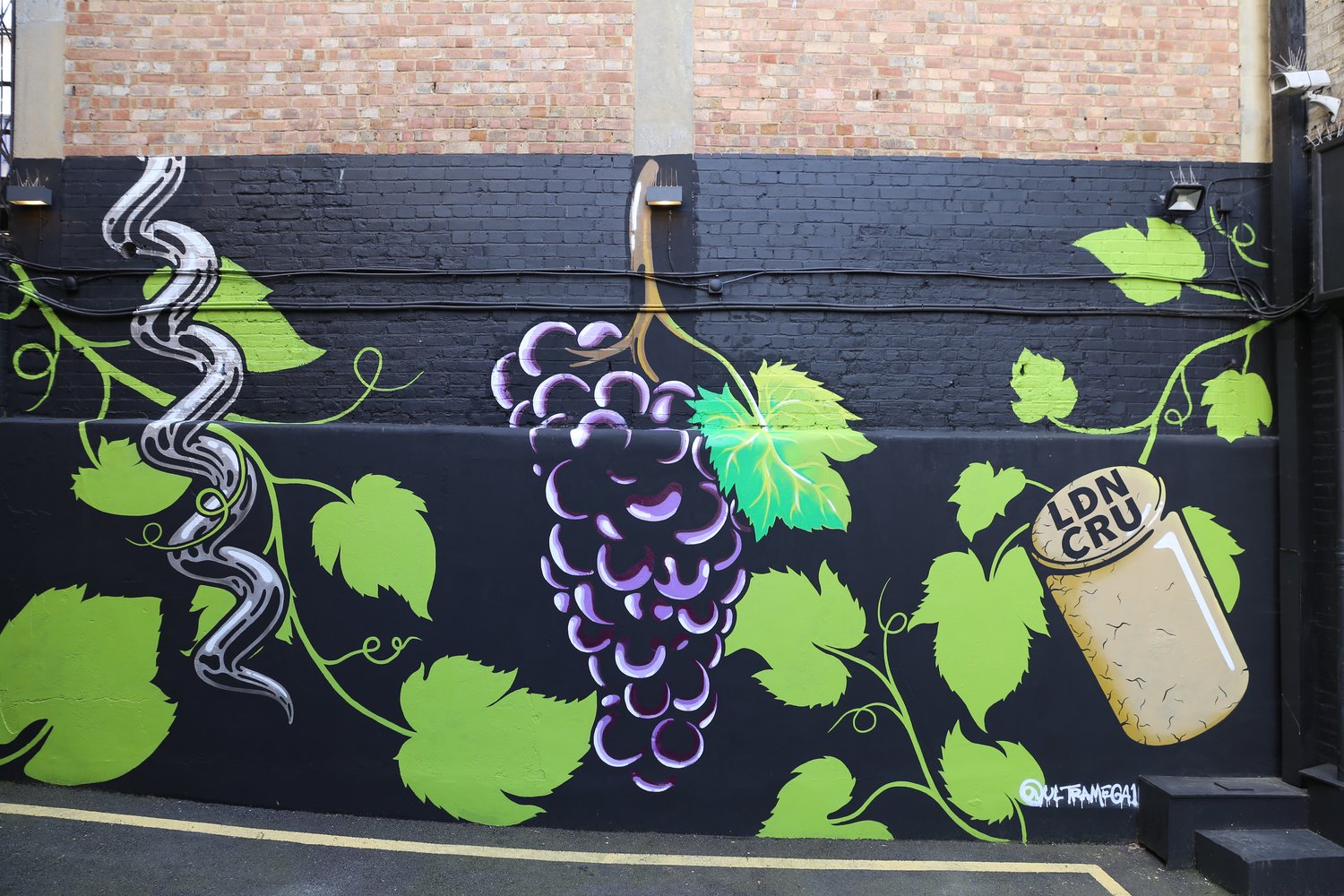
LONDON CRU’S ALEX HURLEY IS ONE OF FEW UK WINEMAKERS PRIORITISING STILL WINES OVER SPARKLING
A HIGH-RISK STRATEGY IN A MARGINAL CLIMATE - LISSE GARNETT ASKED HIM HOW HE DOES IT...
Hurley is the resident Australian winemaker at London Cru and has been for the past two-and-a-half years. Though he appears freakishly youthful, Alex’s CV tells another story. A fully qualified geologist, he spent seven years working in Eastern Australia and Asia, ‘making holes in the ground,’ before transitioning to wine. Then, with the backing of his ex-lawyer wife (she has now given up law in favour of a more altruistic career) he quit his geology calling to go and live alone in a stinking winery caravan, cleaning tanks and developing his wine making knowledge from the bottom up.

Alex (right) enjoying a glass at 67 Pall Mall
His wine career began at a small winery near Melbourne on the Bellarine Peninsula – Lethbridge Estate Winery. Fortuitously, the assistant winemaker at the time was one Alex Byrne, who went on to open Noisy Ritual, Melbourne’s first urban winery. Alex joined the Lethbridge winery team and got obsessively involved in every aspect of the business. The aforementioned onsite caravan proved the ideal spot for a 24/7 nascent nerd to be whilst he learned invaluable winemaking skills. Working for Ray Nadeson and Maree Collis at Lethbridge proved inspirational; it planted a seed in him, a notion of winemaking as an adventure - a project based on passion, drive, and serious dedication. That seed has taken root in the urban winery at London Cru we see today.

Hurley‘s was the Vinifera Euro Masters - a Masters program in Viticulture and Oenology - which he completed while living and working in wineries across Montpellier, Bordeaux and Turin. He then worked in numerous wineries across the world, focusing on Europe with stints in Barolo, Beaune and, finally, Gusbourne in Kent. When Gusbourne’s Charlie Holland took him on, a passion for English wine was ignited that has yet to be extinguished. The reverse commute from Appledore to London - where his wife was based - led him to look for a job closer to home. London Cru in West London proved the ultimate option. On his day off from Gusbourne he knocked on the door to ask if they needed a winemaker. It just so happened they did.
Three Vintages and Numerous Awards In, He Modestly Says He Is Still Finding His Feet
‘Alex is a world class winemaker without a world sized ego. Everyone is welcome at London Cru and Alex is a brilliant teacher, he likes to share his knowledge’ - Cliff Roberson

London Cru opened in 2013 when Cliff Roberson - founder and owner of Roberson Wine - thought it would be a great idea to build London’s first urban winery. A wine trade figure fifty-years standing, Cliff was no stranger to the urban wineries of America and saw no reason why we shouldn’t have one here.
Learn more about Cliff.

Alex waves the veritable Australian flag with his unmatched BBQ prowess
What is the idea behind London Cru Alex?
It makes wine accessible and is also an incredible event space. There is little difference between an urban winery and a winery in the countryside but for the fact the fruit doesn’t come from Fulham. We transport our grapes from the vineyards typically in around an hour-and-twenty minutes – for the Bacchus, the grapes were so good that in 2020 we decided to make a single vineyard expression of the grape. These grapes come from a very special vineyard, in Upperton, owned by sparkling winemaking pros. We are very fortunate they don’t need their Bacchus for their own wines.
 .
.
What about the connection growers have with their fruit, are you at a disadvantage because you buy your fruit rather than grow it?
The advantage of being an urban winery is that we don’t have a vineyard – we can choose the right fruit for the wine that we want to make. We can go to West Sussex, Crouch Valley in Essex, Kent and Canterbury – we don’t have to worry about rain and frost. This flexibility gives us more confidence to make still wine in the UK. Single vineyard wines are more challenging. Sparkling wine production is far less risky in a cool climate because you don’t have to get the ripeness as high as you do for still.
Isn’t it almost impossible to make still wines securely in the UK every year?
We still have to contend with the climate – that’s why I personally prefer to make wines from Bacchus and Pinot Précoce. These grapes are very well suited to our cooler climate and, because of this, every year we can make fabulous Bacchus and Précoce. The style of Bacchus we make is crisp and dry, with a focus on the zesty grapefruit, citrus notes rather than the over-the-top elderflower aromatics you can get with Bacchus. It’s a wonderful food wine, particularly with seafood or spicy, Asian cuisine – Pad Thai is a classic example.
How about Burgundian-style Chardonnay and Pinot Noir for UK stills?
In 2018 Chardonnay was wonderful here in the UK, but in cooler years it can be too austere. On the other hand Pinot Noir from Burgundian clones can be a bit too aggressive in a cold year here. That’s why I generally prefer Pinot Noir Précoce instead of the Burgundian clones.
What is Pinot Noir Précoce?
Pinot Noir Précoce or Frühburgunder is an early ripening Pinot Noir clone. Whilst it won’t deliver a big full-bodied red, it does deliver wonderful fruit in a region we might not otherwise get ripe grapes out of. It is fermented in concrete tanks, fully destemmed, through semi-carbonic fermentation with low levels of extraction. The style we aim for is light and elegant. I’m very inspired by producers in Tasmania that have been doing this style with Pinot Noir over the last 20 years. This wine is best consumed when youthful, maximising the cherry and plum character. In the cooler vintages this wine has a cranberry and rhubarb finish, notes highlighted when served slightly chilled.

Your Bacchus is silky, full, and deep. How do you manage that?
We use a lot of classic techniques – Bordeaux taught me great methods of approaching white grapes with high acidity. The quality of the Bacchus starts with the vines, twenty-years-old on average and very precisely managed. This yields fruit of wonderful aromatics and balance. Once in the cellar, the grapes are hand-sorted, whole bunch pressed, and fermented in stainless steel tanks. Three different yeast cultures were used to ferment this wine at different temperatures - each with a specific role in the final blend. Malolactic fermentation was partially completed, naturally softening the crisp palate and building body.
So the yeast you use is a seriously important component?
I don’t just chuck my grapes in a tank and hope for the best. My master's thesis was focused on yeast selection, and the choice of what type and when is a pivotal part of my winemaking style. Depending on the variety of wine and my desired aromatics, I can have as many as four or five different yeast cultures, each creating a different blending component for the resulting bottling. One yeast can produce elevated thiols like you might find in a Sauvignon Blanc, while another might produce terpenes similar to those found in a Riesling. Then before bottling I’ll piece them back together to produce a final blend.
Can Bacchus age?
Bacchus can definitely age. After two years the 2019 vintage is better now than it ever was, having developed a minty-ness and undergone changes to its aromatic profile. The style becomes less about citrus fruits, with savoury notes developing over time. We have just a few bottles remaining from the 2014 vintage which are still astoundingly good – stylistically like a Riesling – with TDN aromas.
What are the advantages of using Bacchus and Pinot Noir Précoce?
Simply put, these are both early ripening varieties that are well suited to the UK climate. Unlike many other grapes, they are able to hit maturity each year with the amount of sun we have in the UK. Normally harvested in September, these grapes are picked around a month earlier than Burgundian clones. Harvesting in late-October or even November puts your crop at risk due to the potential for rain or frost here in England. On warmer years we might chase down some traditional Chardonnay or Pinot Noir clones but, for the core wines in our line-up, these early ripening varieties are perfect for still wines.




